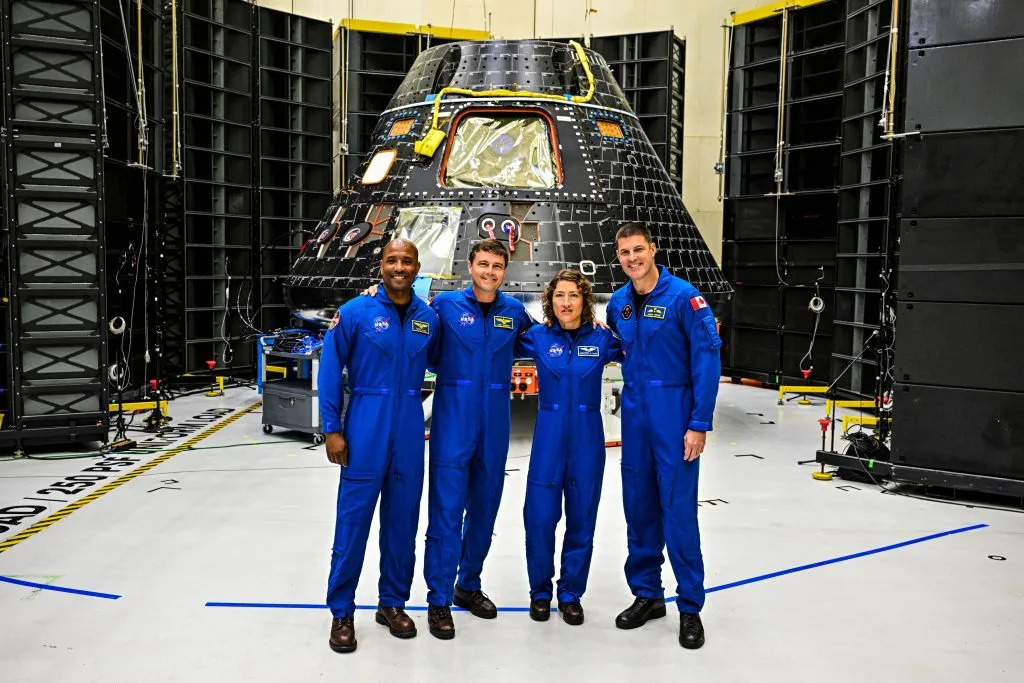If 2023 was anything to go by, this year will witness breakthroughs across every field of science. From cutting-edge advances in artificial intelligence to revolutionary discoveries in health and space exploration, here’s what to expect in science in 2024.
Things are looking up: 2024 in space
If all goes to plan, 2024 will see humanity return to the Moon for the first time in 50 years. NASA’s Artemis II mission is scheduled to launch in late 2024, carrying a crew of four including the first woman and first person of colour to join a lunar mission.
We should also see NASA’s Plankton, Aerosol, Cloud, ocean Ecosystem (PACE) satellite mission launch at the beginning of the year. It aims to collect data to help scientists measure the health of Earth’s oceans.
The long-delayed debut of Ariane 6, ESA’s heavy-lift rocket, is pencilled in for mid-2024. Then, in October, NASA’s Europa Clipper will begin its journey to one of Jupiter’s icy moons to investigate the possibility of life.
Before this, however, the Jupiter Icy Moons Explorer (JUICE) spacecraft (which ESA launched in 2023 with a similar mission) will conduct its first lunar-Earth flyby a few months earlier, this August.
Meanwhile, for those of us staying on Earth, on 8 April a total solar eclipse will sweep across Mexico, Canada and the US – the last in the contiguous US until 2044.
This year also bisects the 76-year orbit of Halley’s comet – meaning it will reach its furthest point away from Earth before beginning its return journey.

New frontiers in health and medicine
Following the attention focused on weight-loss drug semaglutide in 2023, phase 3 trials of a similar antidiabetic, tirzepatide (Mounjaro), are expected to produce results towards the end of 2024.
Advances in CRISPR therapy are also anticipated after the gene-editing tool received UK approval in November 2023 for the treatment of sickle cell disease and the blood disorder Beta-thalassaemia. After this, US approval is expected by March 2024.
Transplant medicine looks set to reach new heights, too. In fact, biotech company eGenesis has suggested that this year it could provide gene-edited pig organs for human babies in need of transplants.
We should also see the results of clinical trials investigating how artificial intelligence (AI) could improve cancer diagnoses, test the efficacy of new cancer treatments and medication combinations, and trial vaccines against HIV and malaria.
Tech horizons
Speculations about OpenAI’s next projects abound, and – although nothing has been formally announced – we’ll be expecting updates to its Generative Pre-trained Transformer (ChatGPT) models.
Generative AI will continue to find novel applications in research fields and daily life, too. The future technology of VR and gaming looks intriguing as tech giants pour resources into mixed reality.
This year’s advances in fundamental areas of human life, from medicine to infrastructure, will be matched and augmented by breakthroughs in robotics, smart materials and eco-materials.
We anticipate more advanced robots able to perform micro-operations inside the body, buildings that react to changing weather conditions, and improved solar cells. Some of these may be made with 4D printers, which use smart materials to create objects that can change shape.
Science in 2024: Culture
Sci-fi spectacles
Book adaptations, reboots and sequels will dominate film in 2024, from Spaceman to Ghostbusters: Frozen Empire. But it’s the sequels that really caught our eye.
Inside Out 2 promises to tackle mental health in teenagers, the first instalment having explored kids’ minds. Also, we’ll be returning to questions of extraterrestrial terraforming in Dune: Part Two.

Game-changers
AI will supercharge camera operations during the Paris 2024 Summer Olympics. Though facial recognition is prohibited, AI surveillance will help detect abandoned items and suspicious activity in large crowds.
Artificial politics
In 2023, OpenAI CEO Sam Altman warned US Congress about the risks AI poses to politics, and with political deepfakes on the rise, concerns about generative AI’s capacity for creating mistruths are growing. Still, there will be several significant elections in 2024, including for the US presidency.
Read more: